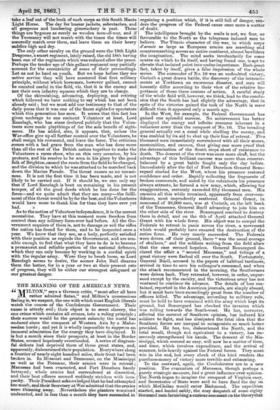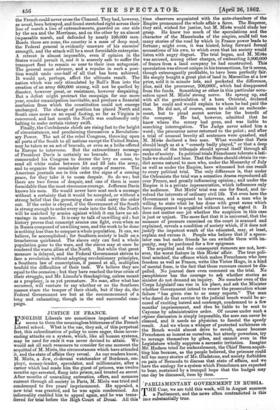THE MEANING OF THE AMERICAN NEWS.
AIILTON," says a German critic, "must after all have rather admired Satan," and Milton's unconscious feeling is, we suspect, the one with which most English liberals watch the course of the Confederate Government. Their cause is utterly evil ; their object is to erect slavery-, the one crime which contains all crimes, into a ruling principle ; their success would be the greatest calamity the world has endured since the conquest of Western Asia by a Maho- medan horde ; and yet it is wholly impossible to suppress an immoral admiration for the energy they have displayed. It is but a month since their prospects, at least in the Border States, seemed hopelessly overclouded. A series of disgrace- ful. 4-lefeats had deprived them of three great states, and, apparently, disheartened their population. Everywhere along a frontier of nearly eight hundred miles, their front had been broken in. In Missouri and Tennessee, on the Mississippi as well as the Potomac, their armies were in retreat ; Manassas had been evacuated, and Fort Donelsou basely betrayed ; whole armies had surrendered at discretion, and their best officers seemed suddenly stricken with inca- pacity. Their President acknowledged that he had attempted too much, and their Secretary at War admitted that t he armies were thinning away. Nevertheless the planters remained undaunted, and in less than a month they have succeeded in regaining a position which, if it is still full of danger, ren- ders the progress of the Federal cause once more a matter of doubt.
The intelligence brought by the mails is not, we fear, so favourable to the North as the telegrams induced men -to believe. The Titanic character of the war, in which corps d'artnee as large as European armies are marching and countermarching across an entire continent, almost bewilders the imagination. The mind seeks involuntarily for some centre on which to fix itself, and having found one, is apt to elevate that isolated point into undue importance. Eaeh great fact, taken by itself, gives a false impression of the whole series. The surrender of No.10 -was an undoubted victory, Corinth a great drawn battle, the discovery of the intrench- mente at Yorktown an enormous disaster, and men will honestly differ according to their view of the relative im- portance of these three centres of action. A careful study of the whole field will, however, we think, lead to the conclu- sion that the South has had slightly the advantage, that in spite of the victories gained the task of the North is more difficult than it appeared only a month ago. In the West, for example, the Federal Government has gained one splendid success. No achievement has better displayed the energy and infinite resource inherent in a volunteer army than the conquest of No.10. The invading general actually cut a canal while shelling the enemy, and was enabled by its aid to shut up their line of retreat. Eve thousand men immediately surrendered with all their stores, • ammunition, and cannon, thus giving one more proof that the determination of the South stops short of resistance to death. The descent of the river was once more cleat-, but the advantage of this brilliant success was more than counter- balanced by a great battle fought only the day before. Immediately after the fall of Fort Donelson General Beau- regard started for the West, where his presence restored confidence and order. Rapidly collecting the fragments of broken commands, and aided by the volunteers his presence always attracts, he formed a new army, which, allowing for exaggerations, certainly exceeded fifty thousand men. His enemies all this while remained, apparently from over-con- fidence, most imprudently scattered. General Grant, in command of 38,000 men, was at Corinth, on the left bank of the Tennessee, General Buell advancing to join him on the other side of the river. Beauregard resolved to destroy them in detail, and on the 6th of April attacked General Grant with his -whole force. His object was to compel the Fedends to retreat in panic across the river, a movement which would probably have ensured the destruction of the entire force. He very nearly succeeded. The Federals were driven off their ground, there "was the usual average of skulkers," and the soldiers writing from the field allow that the ease seemed hopeless. General Beauregard de- clared the affair a "second Manassas," and tidings of a great victory were flashed all over the South. Fortunately, General Buell, accused in the papers of habitual tardiness, arrived in time to save his colleague's command, and when the attack recommenced in the morning, the Southerners were driven back. They retreated, however, in order, unpur- sued except by the cavalry, and the victorious army has not ventured to continue its advance. The details of loss sus- tained, reported in the American journals, are simply absurd, but it must have been exceedingly great from the number of officers killed. The advantage, according to military rule, must be held to have remained with the army which kept its ground, but Beauregard has checked the invasion which was rolling towards the Sonth-west. He has, moreover, affected the current of Southern opinion, has induced his soldiers to fight, and has dissipated the fatal idea that the Southern forces are unequal to antagonists so much better provided. He has, too, disheartened the North, and the total result, though not equivalent to a victory, has im- mensely strengthened his hands. The descent of the Mis- sissippi, which seemed so easy, will now be a matter of tune, and time, which involves expenditure, and the arrival of summer, tells heavily against the Federal forces. They must win in the end, but every check of this kind renders the purchase-money of victory more terrible and exhausting.
To the eastward, again, the Confederates are in a new position. The evacuation of Manassas, though perhaps a purely strategic measure, had a great influence over opinion. The North began to imagine the conquest of Virginia easy, and Secretaries of State were said to have fixed the day on which McClellan would enter Richmond. The expedition started, and handed safely, the easy despatch of some eighty thousand men furnishing a curious comment on the theory that Finally, the Confederate chiefs are rising fast to the height searching interrogation. The judge never asked him a of circumstances, and proclaiming themselves a Revolution- word ; the procureur never returned to the point ; and after any Power. The act of the rebel Congress, throwing open a trial of unusual brevity all sentences were quashed, and all ports of the South to all nations except the United States, M. Mires declared a free man. What wonder that Paris may be taken as an act of bravado, or even as a bribe offered should laugh as at a " comedy badly played," or that a deep to Europe to intervene. But the extraordinary message suspicion of the tribunals should spread itself through all of President Davis is certainly no bravade. He has re- ranks of society. In political trials Frenchmen tolerate a lati- commended his Congress to decree the levy- en masse, to tude we should not bear. That the State should obtain its ver- send all white males between 18 and 35 into the army, diet seems natural to men who, under the Monarchy of July and to organize the remainder into corps of reserve. The as well as under the Empire, have witnessed but one result American journals see in this order the signs of a coming to every political trial. The only difference is, that under peace, for they take it to mean despair. So do we ; but the Orleanists the trial was a sensation drama reproduced all there are two forms of despair, and one of them is more over France, and greatly influencing opinion ; and under the formidable than the most strenuous courage. Jefferson Davis Empire it is a private representation, which influences only knows his men. He would never have sent such a message the audience. But Mires' trial was one for fraud, and in- without a certainty that it would be accepted, or without a volved the interests of ordinary civil life. Yet even here the strong belief that the governing class could carry the order Government is supposed to intervene, and a man who is out. If the order is obeyed, if the Government of the South willing to state what he has done with great sums which is strong enough to order every male into the field, the North have disappeared is acquitted without having stated it. It will be matched by armies against which it can have no ad- does not matter one jot whether the suspicion in this case vantage in number. It is easy to talk of unwilling aid ; but is just or unjust. The mere fact that it is universal, that the history proves that conscript armies can fight, even when as measure of pressure exercised on the court is scanned and rendered the warm allies of the North. But while that great The acquittal and the consequent rumours are not, how- measure is delayed, and the Federal Government strives to ever, the worst feature in this Mires' affair. The true poli- face a revolution without adopting revolutionary principles, tical mischief, the offence which makes Frenchmen who love a Southern law of conscription, if passed at all, multiplies freedom as well as France, write like Victor Hugo, in a kind tenfold the difficulties of their task. We believe they are of mental foam, is the fact that these rumours cannot be dia. equal to the occasion ; but they have reached the true crisis of pelled. No journal dare even comment on the trial. No their struggle, and Mr. Lincoln's thanksgiving, unless meant pamphleteer has the courage to ask whether stories so as a prophecy, is as yet premature. No man, after what has sinister do not demand an inquiry. No member even of the occurred, will venture to say whether or no the Southern Corps Leg,islatif can rise in his place, and ask the Minister masses share the temper of their chiefs, but if they do, the whether Government intend to renew the prosecution whose Federal Government are but at the commencement of a failure "has given rise to so many reports." The man long and exhausting, though in the end successful cam- who dared do that service to the judicial bench would be ac-































 Previous page
Previous page